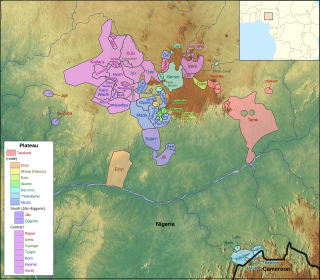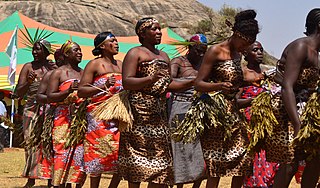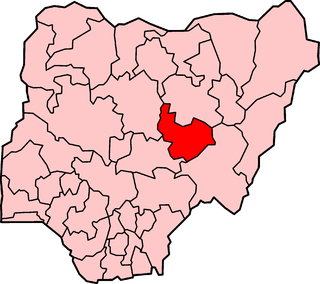Goemai is an Afro-Asiatic language spoken in the Great Muri Plains region of Plateau State in central Nigeria, between the Jos Plateau and Benue River. Goemai is also the name of the ethnic group of speakers of the Goemai language. The name 'Ankwe' has been used to refer to the people, especially in older literature and to outsiders. As of 2008, it was estimated that there were around 200,000 ethnic Goemai, but it is unknown how many of these are native speakers of the language.

The forty or so Plateau languages are a tentative group of Benue–Congo languages spoken by 15 million people on the Jos Plateau Southern Kaduna, Nasarawa State and in adjacent areas in central Nigeria.
Eggon, erroneously referred to as Mada - formerly a Plateau language spoken in central Nigeria. It is a major language in Nasarawa State.

There are over 525 native languages spoken in Nigeria. The official language of Nigeria is English, the language of former colonial British Nigeria. As reported in 2003, Nigerian English and Nigerian Pidgin were spoken as a second language by 60 million people in Nigeria. Communication in the English language is much more popular in the country's urban communities than it is in the rural areas, due to globalization.

The West Chadic languages of the Afro-Asiatic family are spoken principally in Niger and Nigeria. They include Hausa, the most populous Chadic language and a major language of West Africa.
Chakato is a West Chadic language spoken in Plateau State, Nigeria. It was identified by Roger Blench in 2016. It is spoken by about 500 people in one village, Dokan Tofa, which is located on the Jos-Shendam road in Plateau State. Blench (2017) suggests that Chakato may be related to spurious records of the Jorto language. Chakato speakers claim that their language is closely related to Goemai.
Tal is an Afro-Asiatic language spoken in Plateau State, Nigeria. Tal is spoken in a cluster of 53 villages located east of the Panyam-Shendam road. There are 6 dialects of Tal, namely Bongmuut, Buzuk, Nbaal, Muɗak, Muɗong, and Takong.

The Angas, Angas–Sura, or Central West Chadic languages are a branch of West Chadic languages spoken in Plateau State, north-central Nigeria.

Ron is an Afro-Asiatic language cluster spoken in Plateau State, Nigeria. Dialects include Bokkos, Daffo-Mbar-Butura, Monguna. Blench (2006) considers these to be separate languages.
The dozen or so Ninzic languages are a branch of the Plateau family spoken in central Nigeria.
Qua'an Pan is a Local Government Area in Plateau State, Nigeria. Its headquarters are in the town of Baap.
The East Kainji languages are spoken in a compact area of the Jos Plateau in Nigeria, near Jos. There are more than 20 of them, most of which are poorly studied.
Berom or Birom is the most widely spoken Plateau language in Nigeria. The language is locally numerically important and is consistently spoken by Berom of all ages in rural areas. However, the Berom are shifting to Hausa in cities. The small Cen and Nincut dialects may be separate languages. Approximately 1 million (2010) people speak in this language.
Gbantu (Gwantu) is a dialect cluster of Plateau languages in Nigeria. Gwantu is the name of the principal dialect; the others are Numana, Janda and Numbu.
Koro Wachi, natively Tinɔr and Myamya, is a dialect cluster of Plateau languages spoken to the north of Keffi in Nasarawa State Kagarko Local Government Area and Jema'a Local Government of southern Kaduna State in central Nigeria. Koro Wachi forms part of a larger cultural grouping with the Ashe.
Boze, also rendered Buji, is an East Kainji language of Nigeria belonging to the Shammo cluster. Boze is spoken in a contiguous area Bicizà, directly to the north of Jos city in Plateau State, Nigeria.

The Ron, Ronic or Ron–Fyer languages, group A.4 of the West Chadic branch of the Afro-Asiatic language family, are spoken in Plateau State, north-central Nigeria.
Jibyal is a West Chadic language spoken in Plateau State, Nigeria. It was discovered by Roger Blench in 2017.
Nteng is a West Chadic language spoken in Plateau State, Nigeria. Nteng is spoken in the villages of Nteng, Geer, Ɗok, Kelaghal, Lool, Kwaki, Jekmorop, and Gorom, with Gorom being a primarily Bwal-speaking village. Roger Blench (2017) estimates that there are 2,000 speakers as of 2017.

Bicizà which is today called Mc Alley or in some instances, Mista Ali is a small town in Buji district of Plateau state, Nigeria, that has boundaries with Jos North Local Government Area. It is the gateway to the State when coming from Zaria, Kaduna State and Kano State as well, in central Nigeria. It is a village to the Boze or Buji people, a dialect cluster of Kainji languages in Nigeria. Neighboring towns and villages close to Bicizà include Icizà, Zùku, Owoyoyo, Tipo, Bìdiri, Urakun, Bihol, Màlèempe, Gɔ̀rɔɔŋ, Rɛ̀woo, all in Buji district. The language of the people also forms part of the ‘Jere cluster’ and is in turn, part of the Northern Jos group of the East Kainji languages Jos. spoken north of Jos town in Central Nigeria.